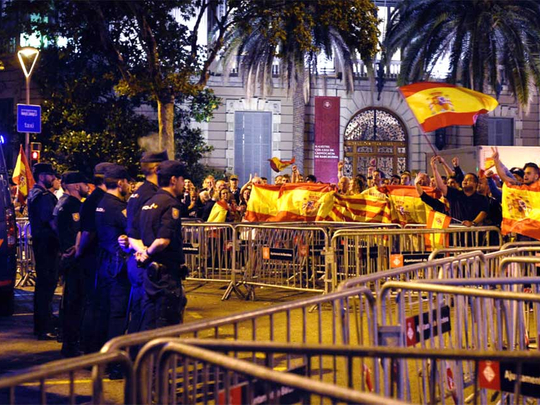
On Tuesday morning, as I passed through airport security at Barcelona Terminal 1 with laptop out, belt off and pockets empty, three stocky police officers stood stone-faced beside a lone member of Spain’s Frontier Guard. Most who passed by looked at the trio in disgust, the braver uttering curses in gutter Spanish or gutsy Catalan.
Two days before, the Guardia Civil, Spain’s national police force, battled the citizenry of Catalonia who were attempting to cast ballots in a referendum that had been deemed illegal by the central government in Madrid, by the Spanish Constitutional Court, and by Catalan’s own High Court. And it were the police actions on Sunday that elicited the gutter and gutsy comments from air passengers.
The voting itself was a cat-and-mouse affair, with the Madrid government, led by Prime Minister Mariano Rajoy, taking every step it could to frustrate the separatists, and the Catalonians too trying to outsmart the manoeuvres from Madrid.
Talking to Catalonians about why they want independence, they are quick to remind you that they have a separate language, history and culture. One person I spoke to at a polling station on Sunday morning went so far as to tell me that Catalonia was the Spanish Empire’s first colony, was brought into Spain before the Americas were “discovered” by Christopher Columbus on 1492, were there before the Philippines, and the rest of the territories claimed in the name of the King of Spain or Madrid over the centuries.
The area around Barcelona is a prosperous one. The region of 7.5 million people accounts for some 13 per cent of the Spanish population and makes up approximately one-fifth of Spain’s gross domestic product. The GDP per capita in 2016 for Catalans was €28,997 (Dh125,302), while for the rest of Spain, it was €22,503.
The port of Barcelona is the busiest in Spain, the transportation system is excellent — it was built up by the Spanish government for the 1992 Summer Olympic Games — and the city is thriving. This year, Barcelona is on course to host 20 million visitors from around the world, up from 16 million in 2015.
Two months ago, unions in the city, along with student groups and social activists, organised anti-tourism rallies, complaining that the influx of visitors meant that rents were too high, and ordinary Catalonians could not afford to both live and work in the city, where the regular wage in the tourism industry was €11 an hour, and a one-bedroom apartment cost €1,200 monthly.
I do not believe that having a distinctive language, culture and history are together sufficient reason for separation. As it stands right now, Spain is made up of 17 regions that each have their own assemblies and make their own laws.
The Basques, who live in the area between northeast Spain and southwest France, straddling the Pyrenees, fought an armed campaign for six decades and claimed more than 800 lives, in their bid for independence from both countries. Six months ago, they forsook violence and have opted for the path of political and constitutional reform instead.
Distinctive culture
The Canarians, living on seven islands off Morocco and more than 1,000 kilometres from mainland Spain, have a distinctive culture and language, and would aspire for independence too one day.
And the Galicians, living between the top of Portugal and the Bay of Biscay, would argue that their language is unique, their culture too, and certainly their food — but worthy of independence?
All Spaniards, regardless of their region, their language, their culture, enjoy the full slate of civil rights imparted to all citizens of Europe. They are free from oppression, free of arbitrary laws, free from torture, free to speak out, and free to express their political opinions, regardless of how distasteful those may be. Look at Israel’s state-sponsored oppression and subjugation of the Palestinian people, and there’s a world of difference between the treatment of Catalans from Madrid and Palestinians by the occupation forces of Israel.
Carles Puigdemont is quick to point out that the actions of the Guardia Civil on Sunday, in pulling people from police places by the hair, swinging batons, and firing rubber bullets to injure so many, is Spanish state-sponsored oppression. It was no different from former British prime minister Margaret Thatcher ordering South Yorkshire police to baton-charge striking coalminers; and it has set relations between the Catalonians and Madrid back to sub-zero.
On Tuesday evening, King Felipe of Spain, made a rare public televised address. In it, he called the actions of the Catalan government reckless, attempting to break “the unity of Spain”. He pointedly said that the Catalan’s government behaviour has “eroded the harmony and coexistence within Catalan society itself, managing, unfortunately, to divide it.”
He made no mention of the actions of police, and I think that even a passing note would have helped heal some of the pain and anger in the wake of the vote, that saw 90 per cent of 2.26 million cast ballots for independence.
Puigdemont and his allies must also look at the fact that there was no opposition campaign, their vote was illegal, and pro-unity Spaniards in Catalonia simply did not vote and ignored the separatists’ folly.
This crisis is the worst since the end of the rule of General Francisco Franco’s dictatorship four decades ago, and the nearest equivalent would be when some 200 members of the Guardia Civil attempted a coup d’etat in 1981.
The only way forward now are for meaningful talks, possible with the outside brokerage of the European Union — though that would likely be unacceptable to Rajoy, who views this as a purely internal Spanish matter. He might be unwise, tempted to dismiss it as such, and the gesture would at least ease some of the hurt from Sunday’s events.
Either way, Catalonia will gain a greater element of autonomy from Madrid. But independence? Never.












